Gettysburg: The Civil War In Its Third Year
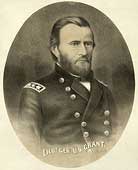
|
| Ulysses S. Grant. |
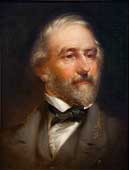 General Robert E. Lee
was not ready to sit idle and wait for the next
Union thrust after Chancellorsville. He had communicated with Richmond for
several months on his desire to make another invasion of the North and by
late May saw an opportunity to take the initiative while Union forces appeared
to be in disarray. Lee's objectives were quite simple: take the war out of
Virginia so that the land could recover, a necessary measure to provide relief
to farms and farmland devastated by battle and foraging armies, and to gather
supplies for his hungry army. His army's movement north of the Potomac River
would not only force the Union Army out of Virginia, but hopefully also draw
Union troops away from the ongoing siege of Vicksburg. Once his army had raided
northern territory, he could gather his troops for battle in an area to his
liking where advantages of position could force the Union to attack and Lee
counterattack as opportunities were presented. Politically, Lee reasoned a
conclusive victory on northern soil would add weight to the growing Northern
peace movement, apply pressure to the Lincoln administration to end the war and
sue for peace, and provide sufficient reason for official recognition of the
Confederacy by European powers. Only the political diplomacy of the Lincoln
administration had kept England and France from recognizing the southern
government as an independent nation. Lee's argument was reasonable to Jefferson
Davis and though the Confederate president was nervous about Richmond not being
fully protected by Lee's forces, he approved the plan.
General Robert E. Lee
was not ready to sit idle and wait for the next
Union thrust after Chancellorsville. He had communicated with Richmond for
several months on his desire to make another invasion of the North and by
late May saw an opportunity to take the initiative while Union forces appeared
to be in disarray. Lee's objectives were quite simple: take the war out of
Virginia so that the land could recover, a necessary measure to provide relief
to farms and farmland devastated by battle and foraging armies, and to gather
supplies for his hungry army. His army's movement north of the Potomac River
would not only force the Union Army out of Virginia, but hopefully also draw
Union troops away from the ongoing siege of Vicksburg. Once his army had raided
northern territory, he could gather his troops for battle in an area to his
liking where advantages of position could force the Union to attack and Lee
counterattack as opportunities were presented. Politically, Lee reasoned a
conclusive victory on northern soil would add weight to the growing Northern
peace movement, apply pressure to the Lincoln administration to end the war and
sue for peace, and provide sufficient reason for official recognition of the
Confederacy by European powers. Only the political diplomacy of the Lincoln
administration had kept England and France from recognizing the southern
government as an independent nation. Lee's argument was reasonable to Jefferson
Davis and though the Confederate president was nervous about Richmond not being
fully protected by Lee's forces, he approved the plan.
While Lee's army made preparations to march, the Army of the Potomac rested in their old winter camps opposite Fredericksburg while its commander, Major General Joseph Hooker, wrestled with innumerable predicaments. Not only were Lee's intentions perplexing Hooker, his relationship with War Department officials in Washington had become almost hostile. The flamboyant Hooker had rebuilt morale and discipline in the army after the disastrous "Mud March" in the winter of 1863, and in late April brilliantly moved the bulk of his forces around Lee's army concentrated at Fredericksburg. Despite the Union advantage, Lee and his top general "Stonewall" Jackson, countered Hooker's strategy and soundly defeated him. Hooker's bluster and bravado before the campaign meant nothing after his miserable failure at the Battle of Chancellorsville. Many in the War Department had lost faith in the general's abilities, including President Lincoln who soon believed Hooker unsuited to contend with Lee.
Hooker approved a plan to probe Lee's defenses and on June 9, the army's cavalry under General Alfred Pleasanton made a surprise attack on General "JEB" Stuart's cavalry camps near Brandy Station, Virginia. Pleasanton's troopers surprised Stuart, but withdrew when Confederate infantry were sighted approaching the battlefield. From this information, Hooker realized that Lee's forces were no longer concentrated in front of him at Fredericksburg. Yet, indecision seemed to strike General Hooker again. He waited for nearly a week before ordering his troops to break camp and then marched cautiously northward, keeping his army between Washington and the suspected Confederate route of march. By this time, Lee's troops had already defeated a Union force at Winchester, Virginia, and crossed the Potomac River into Maryland.
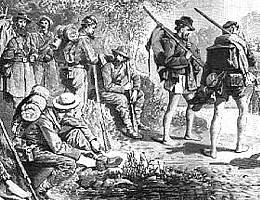 |
"It has been said that the morale of an army is to numbers three to one. If this be true, the Army of Northern Virginia was never stronger than on entering Pennsylvania that summer." - General Henry Heth |
|
Confederates ford the Potomac River, drawn by Confederate veteran Allen C. Redwood. (Battles & Leaders) |
Despite the loss of "Stonewall" Jackson, the Army of Northern Virginia was never stronger both in manpower and high morale than in the summer of 1863. "It was an army of veterans," recalled A.H. Belo, Colonel of the 55th North Carolina Infantry, "an army that had in two years' time made a record second to none for successful fighting and hard marching." In mid-June, Lee's soldiers crossed the Potomac River and stepped into a rich land barely touched by the war. Except for some persistent Union cavalry units, the southerners tramped along unopposed as militia units retreated from their path leaving the land and its residents to the mercy of the Confederates.
For Lee's men who had been living for months on reduced rations, Maryland and Pennsylvania were bursting with plenty. "I can hardly believe that a rebel army has actually left poor Virginia for a season," wrote Major Eugene Blackford of the 5th Alabama Infantry. "Of course there is no end of milk and butter which our soldiers enjoy hugely." Encounters with the civilian population of Maryland and Pennsylvania made for good subject matter in letters home such as that of Private William McClellan of the 9th Alabama Infantry, who described Pennsylvanians as, "the most ignorant beings of the world. They don't care how long the war lasts so they are not troubled." Like many of his comrades, McClellan especially detested the females who, "would not look at a Rebel, they would turn up their nose and toss their heads to one side as contemptuously as if we were high way Robers."
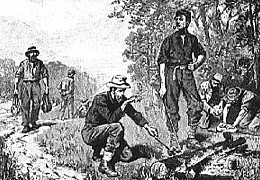 |
|
A meal on the march, by Allen C. Redwood.
(Battles & Leaders) |
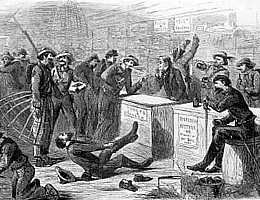 |
|
Confederates invade a northern store.
(Harper's Weekly) |
This first encounter was not without a bloody mishap. A small squad from the 21st Pennsylvania Emergency Cavalry was chased out of town and Private George Sandoe was shot and killed, the first official casualty of the coming battle. Early did not tarry for long in Gettysburg, but moved on toward York and Columbia where he was stopped by Pennsylvania militia that burned the bridge over the Susquehanna River. Meanwhile other Confederate forces had occupied a large area of south central Pennsylvania and some had even closed on Harrisburg, threatening the state capitol.
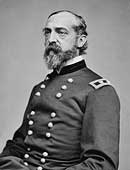 The slow pursuit of Lee by the Army of the Potomac not only alarmed War
Department officials but shocked governors of northern states who clamored for
something to be done to stop the rebel invasion. Political pressure on the
Lincoln administration added to the tug of war between General Hooker and the
US War Department, which finally ended on June 28 as the Army of the Potomac
concentrated at Frederick, Maryland. Completely frustrated by the mistrust and
lack of support from War Department officials, General Hooker requested to be
relieved of command, which was quickly granted.
The slow pursuit of Lee by the Army of the Potomac not only alarmed War
Department officials but shocked governors of northern states who clamored for
something to be done to stop the rebel invasion. Political pressure on the
Lincoln administration added to the tug of war between General Hooker and the
US War Department, which finally ended on June 28 as the Army of the Potomac
concentrated at Frederick, Maryland. Completely frustrated by the mistrust and
lack of support from War Department officials, General Hooker requested to be
relieved of command, which was quickly granted.
Major General George Gordon Meade was ordered to take command of the army. "I have been tried and condemned", the surprised general remarked after receiving word of his appointment. Using traces of information known on Lee's whereabouts and objectives, Meade decided to send the army north to feel for the enemy and draw Lee into battle on a defensive line he wanted to establish on Pipe Creek, Maryland. The very next day, the Army of the Potomac marched out of their camps to search for the Confederates in Pennsylvania.
The Opening Shots
On June 30, Confederate troops left their camps at Cashtown and marched toward Gettysburg in search of supplies. Upon reaching the edge of Gettysburg, scouts spied a column of Union cavalry south of town, closing fast. Under orders not to initiate a battle, the Confederates returned to Cashtown where they reported the encounter to their commander, Lt. General A.P. Hill. Hill agreed to send two divisions of his corps toward Gettysburg the next day to investigate the arrival of the mystery cavalrymen and the stage was set for the opening of the battle on July 1st, 1863.
| The Battle of Gettysburg begins! | |
|
"A most terrible day..." The southern victory of July 1 was not a decisive one. General Lee took the initiative to attack the following day, July 2, 1863, which would be the bloodiest day of the battle. | |
|
"I will strike him there." The outcome still undecided, General Lee chose July 3 to make one last effort to break the Union line and give the Confederacy its most needed victory. It would steep one of his generals in controversy and give another, George Edward Pickett, lasting fame. |